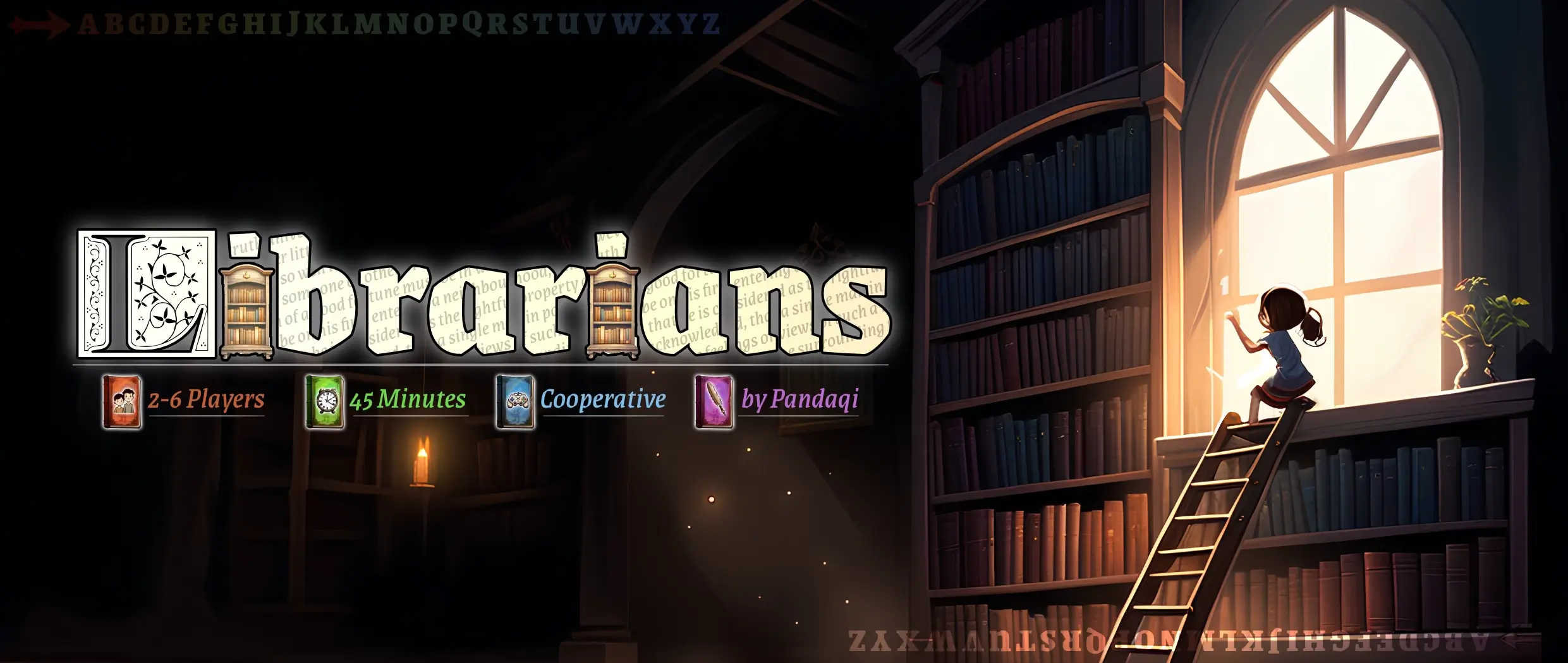
Silence in the library! Work together to fill bookshelves in alphabetical order, but without any communication.
What do I need?
Three simple steps.
- Read the short playful rules.
- Click Download > Files > "1 - Base Set.pdf"
- Print, cut, play!
Want more? You can also generate your own material right on this website! Or pick one of the other PDFs available in the Download section.
Material
Pick your desired settings and press the button! (A new page will open.) When in doubt, just use the defaults for your first game(s).
Packs / Genres
(Click to fold.)Not working? Or unsure what to do? The "Download" button above has PDFs I already made for you! Pick any one of those.
Credits
The fonts used are Grenze Gotisch (text + headings) and Fleur Caps (for extravagant flowery capital letters on some things). Some generative AI was used for the faint book covers you see. Everything else—idea, code, assets, rules, other illustrations—is mine.
The development of this game was very odd. I want to talk about this here because it may be interesting to read, or save fellow game developers some trouble.
The game itself is extremely simple, perhaps one of my best in terms of the balance between simple rules and depth of play. An intuitive theme, cooperative gameplay, unique concept.
Buuuut when I conceived the idea, I was in a bit of a slump. I wrote down the idea as “promising”, but I lacked the energy to work on it, and I was already struggling through other projects.
Only a year later, the idea resurfaced as my “next simplest idea”, and I decided to make it. I quickly created a paper prototype (fold some papers, write letters on them, cut) and played it against myself. This refined the rules further, until it confirmed to me that the idea was indeed promising.
Then I made 80% of the game and had to drop it again. Renovations to my home had started, which upended my entire work routine, my sleep schedule, the tools I had access too, and so forth. It was just too much of a struggle to do anything, so I wrote down a deadline for this idea (~1 year from then) and let it go.
Well, after a year of procrastination on this specific idea—I made 30 other games in that period, but this one just never felt right—I had to finish it. I opened up the project folder. I updated some code and folder structure to my modern standards; my Pandaqi website had improved massively in the meantime.
And then I saw I had been stupid. This game wasn’t ~80% done. It was 99% done. I just needed to draw some final icons, create rulebook images, and do some minor polishing. Which is nothing compared to the mountain of work I’d done before then.
The moral of this story is to just finish projects in the moment. This exact thing has happened to me several times, and every time the project was 99% done. If I’d worked on it one more day back then, it would be finished. But now, because I’d been away for so long, it took way more time to get back into the project and figure out what I was doing again.
For some reason, being away from a project (or “not making progress on it”) makes our brains think more negatively on it. As if we only remember flaws, and then over time our memory twists that and makes it even worse. When I came back to the game, all I saw was a finished, working, good-looking game that I should’ve finished long ago.
Ironically, one of the simplest ideas I ever wrote down (about placing books in alphabetical order), became the hardest and most time-consuming game project in quite some time.
That’s the second moral of this story. Don’t overcomplicate things. Keep small ideas … small and simple. Don’t add 24 genres and a loooong list of puns on author and bestselling book names ;)